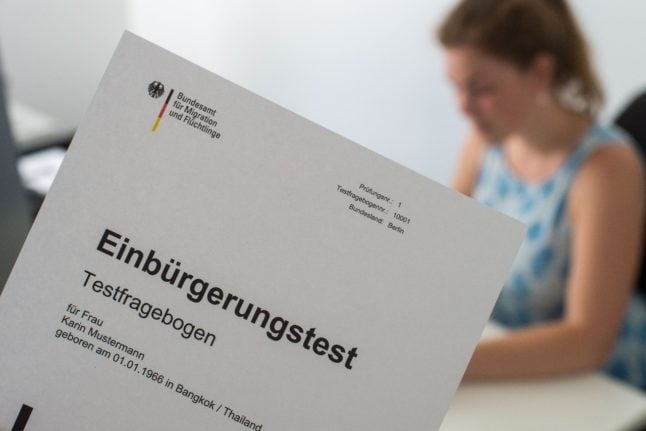EXPLAINED: What I was asked about in my German citizenship test

If you're taking the German citizenship test, you'll be hit with a random selection of questions on anything from former German chancellors to returning a faulty TV. Here are some of the questions I faced - and some tips for preparing for the unexpected.
If you're anything like me, sitting any kind of exam always feels daunting, even if it's one you've heard isn't too difficult to pass.
The silent rooms, the ticking clocks, the invigilator at the front of the room - the whole experience takes me back to my school years, conjuring up memories of being the person who struggled to finish in time and who inevitably failed to notice those ten extra questions on the back of the exam.
Luckily, though, the German citizenship test isn't too much like exams I've taken in the past. Though the stakes are admittedly high, the pressure somehow felt much, much lower.
For starters, you don't have to worry about getting an impressive grade in your German citizenship test - though of course it's nice to do well. Your results are either a "pass" or a "fail", and the bar to hit in order to pass is a 50 percent success rate.
That means that, out of 33 questions in total, you only have to get 17 right in order to pass the test. And to make things even simpler, the questions are multiple choice - so if you're really stuck, you still have a chance of striking lucky if you tick any of the four potential answers.
So when I arrived to sit my citizenship test in Berlin's Treptow-Köpenick district on Thursday, the nerves weren't too overwhelming. In fact, my biggest worry was that I had forgotten some minor administrative hurdle and would be sent home with a stern expression and told to rebook in six months' time.
READ ALSO: When and how can I apply for German citizenship?
Thankfully, after showing my passport and putting my initials on a little attendance form, I was allowed into the exam room at the Volkshochschule - and then it was simply a case of listening to some simple instructions, shutting away my phone in my backpack and waiting to take the test.
Before the exam started, the invigilator let us know that we'd all be given a different selection of questions, so there was no point in trying to see what anyone else was doing.
That said, there are common themes - and questions - that tend to come up time and time again. Here's how my exam went down.
What you need to know for the German citizenship test
From taking a few practice exams before sitting the citizenship test, I'd say my experience was pretty typical in terms of difficulty and the make-up of the questions and topics that crop up.
The test consists of 33 questions that are picked from a catalogue of 310. Of these, 30 questions will be about Germany in general - anything from politics to day-to-day life - and these will be picked from 300 possible questions on an array of different themes.

New German citizens gather for a naturalisation ceremony in Frankfurt am Main. Photo: picture alliance/dpa | Frank Molter
The final three questions will be related to the federal state you live in - in my case, Berlin. These are picked from a possible 10, so this part is pretty easy to prep for.
Of course, it can be nerve-wracking not knowing what's going to come up, but if you do enough practice questions you'll realise that there are only really a limited number of topics that are covered. These are the main ones.
READ ALSO: TEST: Could you pass the German citizenship exam?
General Knowledge
Whether it's the national anthem or Germany's crest, having a basic knowledge of Germany's national symbols and constitution is important for passing the citizenship test.
For instance, you might get asked to name the colours of the flag (in order), say who wrote the lyrics to the national anthem, or identify a picture of the Reichstag or the Bundesadler. You might also have some questions about the former eastern and western states.
Alternatively, you could also be asked about certain national holidays in Germany and a few of the cultural traditions behind them.
In my case, the questions weren't too tricky for someone who's lived in Germany for a little while. Here are five of the key ones I was asked:
- What animal is on the German crest? (Eagle)
- Which religion has shaped European and German culture? (Christianity)
- What is 'Pfingsten'? (A Christian public holiday)
- For which celebration do people in Germany wear colourful costumes and masks? (Rosenmontag)
- Which of the following states was previously in the DDR? (Thuringia)
History
Possibly the most daunting topic on the test, you can probably expect to get at least five or so questions relating to German history. But there's no need to panic, since you're not going to be asked to name the birthplace and birth year of some lesser-know monarch like König Otto.
In fact, from my experience, you can pretty much assume that most history questions will be related either to Nazi-era Germany, the Second World War or the DDR years. Here are a few of the questions that came up up for me:
- What year did Adolf Hitler come to power in Germany? (1933)
- What year was the Berlin Wall built? (1961)
- What did the word "Monday demonstration" mean in Germany in 1989? (Demonstrations every Monday against the DDR regime.)
- What did the term "Iron Curtain" refer to? (The Warsaw Pact against the West)
- Who was the first chancellor of the Federal Republic of Germany? (Konrad Adenauer)
If any of these seem tricky, it's worth remembering that they are multiple choice questions, so you may see an answer that rings a bell. And, in the worst-case scenario, you may not do as well on this part of the test and simply need to find your 17 correct answers elsewhere.
Society and the Constitution
This part of the test generally involves various ways of asking whether Germany is a democracy and what kind of rights are enshrined in the Basic Law, such as the right to free speech and thought (Meinungsfreiheit) or the right to choose your own faith and religion.
You might also be asked questions that are designed to check whether you're on board with some basic assumptions about, for example, the right to protest or the equal rights of different ethnicities or genders.
 A woman takes her German citizenship. Photo: picture alliance/dpa | Lino Mirgeler
A woman takes her German citizenship. Photo: picture alliance/dpa | Lino Mirgeler
Here are a few of the questions that came up in my test:
- Which of these rights is NOT enshrined in the Basic Law? (The right for everyone to have the same amount of money)
- What is compatible with the German Basic Law? (Financial penalties / fines)
- Two friends want to go to a public swimming pool in Germany. Both have dark skin and are therefore not allowed in. Which right is violated in this situation? (The right to be treated equally)
READ ALSO: TEST: Is your German good enough for citizenship or permanent residency?
Daily Life
Anyone who's lived in Germany for long enough to be applying for citizenship probably understands that life here involves doing things a certain way, and knowing that way can save you a lot of trouble in the long run.
That's probably enough reason to freshen up your knowledge of admin and the more bureaucratic aspects of daily life before taking the citizenship test.
That said, you don't have to have an encyclopaedic knowledge of every possible Amt there is to know about - and let's face it, the majority of Germans don't either. But it's good to have a basic idea of the social security system, for example, or where to go if you need to register an address or claim a certain type of benefits.
Here are a few of the questions I was asked on this topic:
- Where do you have to go first in Germany if you want to get married? (Standesamt)
- What does the Career Information Center BIZ at the Federal Employment Agency in Germany help with? (Finding a job)
- What do eligible citizens in Germany get before an election? (A voting slip from the municipality)
I was also shown four pictures of voting slips with various numbers of ticks in the first and second candidate boxes and asked to pick which of them would be accepted in a federal election. As you can imagine, the slip with one candidate ticked on each side of the ballot was correct.
READ ALSO: EXPLAINED: How I got German citizenship – and how you can too
Politics
Out of all the topics on the citizenship test, this is one that tends to crop up the most in various shapes and sizes - and you should be aware that you may not just be asked about national politics, but also about the federal states and even the EU as well.
If you read The Local regularly, you're probably pretty clued up on this already - and you're bound to know, for instance, that the current German chancellor is called Olaf Scholz.

The German flag flies in front of the dome of the Reichstag in Berlin. Photo: picture alliance / Soeren Stache/dpa | Soeren Stache
Otherwise, it's a good idea to brush up a little on how the politic system works - i.e. how the chancellor and president are elected, the difference between the Bundesrat and Bundestag, and what state elections are called - if this is a weak area for you.
Here's a selection of the slightly nerdy political questions that cropped up for me:
- Who is responsible for electing the chancellor of Germany? (Bundestag)
- What does the abbreviation CSU mean in Germany? (Christian Social Union)
- What do you call members of parliament elected by the citizens? (Abgeordnete / Deputies)
- In Germany, a change of government in a federal state can have an impact on the
federal policy. How? (Governing becomes harder if the government lose a majority in the Bundesrat)
- Germany is a founding member of what? (The European Union)
Berlin
As mentioned, every citizenship test involves three questions related to the state you live in, which will mostly be basic questions about the state symbols, flags and political system.
The three questions I was asked about Berlin were as follows:
- What colours are on the Berlin flag? (red and white)
- What do you call the head of the government in Berlin? (Governing mayor)
- The state parliament in Berlin is elected for how many years? (5)
I certainly didn't know the answer to every single question on my test, but having a full hour gave me a good amount of time to check everything over - and I still l was left with more than half the time to spare.
So, take your time, brush up a few of your weak areas and don't fret if there's something you don't know. There's always a chance to find those 17 right answers elsewhere in the test.
Comments (1)
See Also
If you're anything like me, sitting any kind of exam always feels daunting, even if it's one you've heard isn't too difficult to pass.
The silent rooms, the ticking clocks, the invigilator at the front of the room - the whole experience takes me back to my school years, conjuring up memories of being the person who struggled to finish in time and who inevitably failed to notice those ten extra questions on the back of the exam.
Luckily, though, the German citizenship test isn't too much like exams I've taken in the past. Though the stakes are admittedly high, the pressure somehow felt much, much lower.
For starters, you don't have to worry about getting an impressive grade in your German citizenship test - though of course it's nice to do well. Your results are either a "pass" or a "fail", and the bar to hit in order to pass is a 50 percent success rate.
That means that, out of 33 questions in total, you only have to get 17 right in order to pass the test. And to make things even simpler, the questions are multiple choice - so if you're really stuck, you still have a chance of striking lucky if you tick any of the four potential answers.
So when I arrived to sit my citizenship test in Berlin's Treptow-Köpenick district on Thursday, the nerves weren't too overwhelming. In fact, my biggest worry was that I had forgotten some minor administrative hurdle and would be sent home with a stern expression and told to rebook in six months' time.
READ ALSO: When and how can I apply for German citizenship?
Thankfully, after showing my passport and putting my initials on a little attendance form, I was allowed into the exam room at the Volkshochschule - and then it was simply a case of listening to some simple instructions, shutting away my phone in my backpack and waiting to take the test.
Before the exam started, the invigilator let us know that we'd all be given a different selection of questions, so there was no point in trying to see what anyone else was doing.
That said, there are common themes - and questions - that tend to come up time and time again. Here's how my exam went down.
What you need to know for the German citizenship test
From taking a few practice exams before sitting the citizenship test, I'd say my experience was pretty typical in terms of difficulty and the make-up of the questions and topics that crop up.
The test consists of 33 questions that are picked from a catalogue of 310. Of these, 30 questions will be about Germany in general - anything from politics to day-to-day life - and these will be picked from 300 possible questions on an array of different themes.

The final three questions will be related to the federal state you live in - in my case, Berlin. These are picked from a possible 10, so this part is pretty easy to prep for.
Of course, it can be nerve-wracking not knowing what's going to come up, but if you do enough practice questions you'll realise that there are only really a limited number of topics that are covered. These are the main ones.
READ ALSO: TEST: Could you pass the German citizenship exam?
General Knowledge
Whether it's the national anthem or Germany's crest, having a basic knowledge of Germany's national symbols and constitution is important for passing the citizenship test.
For instance, you might get asked to name the colours of the flag (in order), say who wrote the lyrics to the national anthem, or identify a picture of the Reichstag or the Bundesadler. You might also have some questions about the former eastern and western states.
Alternatively, you could also be asked about certain national holidays in Germany and a few of the cultural traditions behind them.
In my case, the questions weren't too tricky for someone who's lived in Germany for a little while. Here are five of the key ones I was asked:
- What animal is on the German crest? (Eagle)
- Which religion has shaped European and German culture? (Christianity)
- What is 'Pfingsten'? (A Christian public holiday)
- For which celebration do people in Germany wear colourful costumes and masks? (Rosenmontag)
- Which of the following states was previously in the DDR? (Thuringia)
History
Possibly the most daunting topic on the test, you can probably expect to get at least five or so questions relating to German history. But there's no need to panic, since you're not going to be asked to name the birthplace and birth year of some lesser-know monarch like König Otto.
In fact, from my experience, you can pretty much assume that most history questions will be related either to Nazi-era Germany, the Second World War or the DDR years. Here are a few of the questions that came up up for me:
- What year did Adolf Hitler come to power in Germany? (1933)
- What year was the Berlin Wall built? (1961)
- What did the word "Monday demonstration" mean in Germany in 1989? (Demonstrations every Monday against the DDR regime.)
- What did the term "Iron Curtain" refer to? (The Warsaw Pact against the West)
- Who was the first chancellor of the Federal Republic of Germany? (Konrad Adenauer)
If any of these seem tricky, it's worth remembering that they are multiple choice questions, so you may see an answer that rings a bell. And, in the worst-case scenario, you may not do as well on this part of the test and simply need to find your 17 correct answers elsewhere.
Society and the Constitution
This part of the test generally involves various ways of asking whether Germany is a democracy and what kind of rights are enshrined in the Basic Law, such as the right to free speech and thought (Meinungsfreiheit) or the right to choose your own faith and religion.
You might also be asked questions that are designed to check whether you're on board with some basic assumptions about, for example, the right to protest or the equal rights of different ethnicities or genders.

Here are a few of the questions that came up in my test:
- Which of these rights is NOT enshrined in the Basic Law? (The right for everyone to have the same amount of money)
- What is compatible with the German Basic Law? (Financial penalties / fines)
- Two friends want to go to a public swimming pool in Germany. Both have dark skin and are therefore not allowed in. Which right is violated in this situation? (The right to be treated equally)
READ ALSO: TEST: Is your German good enough for citizenship or permanent residency?
Daily Life
Anyone who's lived in Germany for long enough to be applying for citizenship probably understands that life here involves doing things a certain way, and knowing that way can save you a lot of trouble in the long run.
That's probably enough reason to freshen up your knowledge of admin and the more bureaucratic aspects of daily life before taking the citizenship test.
That said, you don't have to have an encyclopaedic knowledge of every possible Amt there is to know about - and let's face it, the majority of Germans don't either. But it's good to have a basic idea of the social security system, for example, or where to go if you need to register an address or claim a certain type of benefits.
Here are a few of the questions I was asked on this topic:
- Where do you have to go first in Germany if you want to get married? (Standesamt)
- What does the Career Information Center BIZ at the Federal Employment Agency in Germany help with? (Finding a job)
- What do eligible citizens in Germany get before an election? (A voting slip from the municipality)
I was also shown four pictures of voting slips with various numbers of ticks in the first and second candidate boxes and asked to pick which of them would be accepted in a federal election. As you can imagine, the slip with one candidate ticked on each side of the ballot was correct.
READ ALSO: EXPLAINED: How I got German citizenship – and how you can too
Politics
Out of all the topics on the citizenship test, this is one that tends to crop up the most in various shapes and sizes - and you should be aware that you may not just be asked about national politics, but also about the federal states and even the EU as well.
If you read The Local regularly, you're probably pretty clued up on this already - and you're bound to know, for instance, that the current German chancellor is called Olaf Scholz.

Otherwise, it's a good idea to brush up a little on how the politic system works - i.e. how the chancellor and president are elected, the difference between the Bundesrat and Bundestag, and what state elections are called - if this is a weak area for you.
Here's a selection of the slightly nerdy political questions that cropped up for me:
- Who is responsible for electing the chancellor of Germany? (Bundestag)
- What does the abbreviation CSU mean in Germany? (Christian Social Union)
- What do you call members of parliament elected by the citizens? (Abgeordnete / Deputies)
- In Germany, a change of government in a federal state can have an impact on the
federal policy. How? (Governing becomes harder if the government lose a majority in the Bundesrat) - Germany is a founding member of what? (The European Union)
Berlin
As mentioned, every citizenship test involves three questions related to the state you live in, which will mostly be basic questions about the state symbols, flags and political system.
The three questions I was asked about Berlin were as follows:
- What colours are on the Berlin flag? (red and white)
- What do you call the head of the government in Berlin? (Governing mayor)
- The state parliament in Berlin is elected for how many years? (5)
I certainly didn't know the answer to every single question on my test, but having a full hour gave me a good amount of time to check everything over - and I still l was left with more than half the time to spare.
So, take your time, brush up a few of your weak areas and don't fret if there's something you don't know. There's always a chance to find those 17 right answers elsewhere in the test.
Join the conversation in our comments section below. Share your own views and experience and if you have a question or suggestion for our journalists then email us at [email protected].
Please keep comments civil, constructive and on topic – and make sure to read our terms of use before getting involved.
Please log in here to leave a comment.